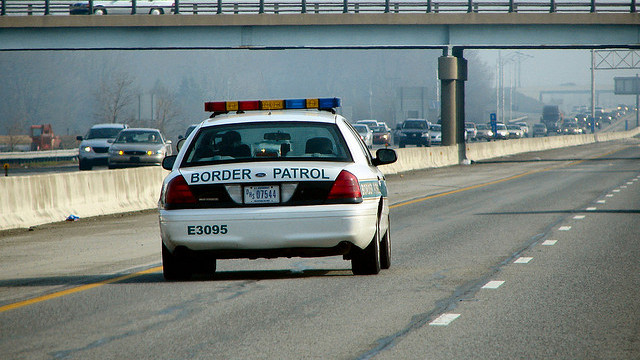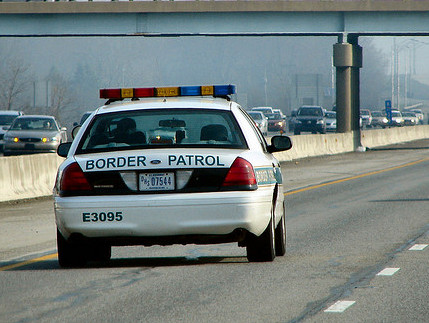
On Tuesday, the American Civil Liberties Union of Washington and the Department of Justice settled a civil rights lawsuit regarding what the group called a violation of constitutional rights by U.S. Border Patrol agents on the Olympic Peninsula in the western portion of Washington state.
The settlement agreement was a response to an April 26, 2012 lawsuit, Sanchez v. Homeland Security, which was filed by three Washington-based plaintiffs along with the help of the ACLU and the Northwest Immigrant Rights Project (NWIRP) against the Border Patrol, U.S. Customs and Border Protection (CBP) and the Department of Homeland Security.
All three plaintiffs are U.S. citizens and allege they were stopped by Border Patrol agents for no other reason than the color of their skin or their ethnicity, since the agents failed to provide valid reasons as to why they had stopped the men and reportedly had no reasonable suspicion to pull them aside for further inspection.
Instead they say they were stopped so the agents could determine their immigration status.
The settlement hasn’t received much acclaim, likely because the agreement does not include any damages or legal fees to the plaintiffs and does not require the Border Patrol to acknowledge any wrongdoing, use of illegal traffic stops or violation of the U.S. Constitution.
However under the terms of the settlement, the Border Patrol agents at the Port Angeles station in Washington will receive a refresher training course designed by CBP on the Fourth Amendment and what kinds of “reasonable suspicion” traffic stops can be done without violating the U.S. Constitution.
Additionally, during the next 18 months, the Border Patrol will provide documents to the ACLU and the NWIRP that describe the frequency and rationale for each Border Patrol stop at the Port Angeles station, but will not include any information identifying the drivers or occupants of the vehicles.
Sarah Dunne, the legal director for the ACLU of Washington, said, “Today’s settlement is significant because Border Patrol officially agreed to follow the Constitution and not racially profile Latinos and other minorities along the Peninsula. This settlement will make a real difference in people’s daily lives. People should not have to fear that they could be stopped and questioned without reason any time they drive or are passengers in cars.”
License, registration and proof of citizenship, please
Jose Sanchez works as a correctional officer at the Olympic Corrections Center. He says Border Patrol agents stopped his vehicle at a checkpoint in 2011 and told him that the vehicle’s windows were too dark, even though the driver’s side window was not tinted. During their inspection, Sanchez says the agents then began to ask him about where he was from and whether or not he was a U.S. citizen.
A similar thing happened to Ismael Ramos Contreras. On his way with four other passengers to pick up tuxedos for a Quinceañera celebration — a Mexican tradition celebrating a girl’s fifteenth birthday — Contreras said the vehicle he was in was stopped by Border Patrol agents. At the time, Contreras was a senior in high school and also happened to be the student-body president.
Contreras said one of the border patrol agents tried to take the car keys out of the ignition himself, so the driver handed over the key to him. Four other agents then began to question the five teenagers about their immigration status, but never provided a reason as to why they were stopped.
Then again in December 2011, Contreras says he was approached outside of the Clallam County District Courthouse by a plainclothes agent, who asked him where he lived and where he was born.
The third plaintiff was Ernest Grimes, who works as a correctional officer and part-time police officer for the Neah Bay Police Department. Grimes says he was stopped in 2011 near Clallam Bay, and says without any explanation, a Border Patrol agent approached his car with his hand on his weapon and yelled at Grimes to roll down his window. The agent then interrogated Grimes — who was wearing his correctional officer uniform at the time — about his immigration status.
Matt Adams is the legal director of NWIRP. He agreed with Dunne the settlement was a step forward and said the significance of the settlement is that the Border Patrol “can’t pull over a vehicle because of the driver’s race or ethnicity or simply because the person lives in proximity to the border.”
Adams said both the ACLU and NWIRP “hope that the reporting requirements and the additional training will ultimately provide greater accountability, and restore a measure of dignity for folks who live in this region.”
In a news release, U.S. Attorney Jenny A. Durkan said, “This settlement is confirmation that we can both ensure the safety of our borders and protect all members of our communities in a constitutional manner.
“I appreciate the dedication and hard work of the Border Patrol, who are both the first line of defense against danger and the first to welcome millions of our visitors. I commend all the attorneys who worked to reach a settlement that moves us forward,” Durkan said. “This settlement is confirmation that we can both ensure the safety of our borders and protect all members of our communities in a constitutional manner.”
But as Mint Press News previously reported, there is a rather large loophole when it comes to a U.S. citizen’s constitutional rights if they are near the border, since the U.S. government considers a 100-mile stretch of land from the actual border to be a “Fourth Amendment-Free Zone.”
What this means is that U.S. citizens and all others who cross the U.S. border can be searched without any reasonable suspicion, according to the Department of Homeland Security. Since the gray-area is so large, the Constitution-Free Zone encompasses the entire states of Connecticut, Delaware, Florida, Hawaii, Maine, Massachusetts, Michigan, New Hampshire, New Jersey and Rhode Island, meaning individuals don’t have to be crossing a border in order to be searched or questioned.


